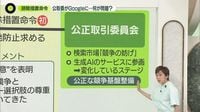On April 15, 2025, the Japan Fair Trade Commission (JFTC) took a significant step in regulating the practices of major tech companies by issuing a cease and desist order against Google. This unprecedented move marks the first time a major IT company has faced such action in Japan, as the JFTC accused Google of violating the Antimonopoly Act. Specifically, the commission stated that Google had been forcing smartphone manufacturers to pre-install the Chrome browser and other search applications, positioning their icons prominently on devices.
The JFTC's order demands that Google immediately halt these illegal activities to restore a competitive market environment and prevent future violations. This action is part of a broader effort to address concerns over the dominance of foreign tech giants in Japan's digital landscape.
Interestingly, the JFTC's actions have sparked debate about the effectiveness of such measures. Critics argue that even if Yahoo! Japan were to switch its search engine from Google to Microsoft, it would not significantly enhance competition. This is largely because both Yahoo! Japan and Microsoft are foreign-owned entities, which means that the competition would not necessarily favor Japanese-owned tech companies.
Moreover, Google's primary rival in the market is Apple's iPhone, which complicates the competitive landscape further. Apple provides both the operating system and the search engine, effectively eliminating any real competition in that regard. As a result, the JFTC's regulatory efforts may not yield the desired outcomes, given that there are currently no Japanese-owned search services capable of competing with Google.
The article also highlights the historical context of Japan's search engine development. Google was founded in September 1998 by Stanford students Larry Page and Sergey Brin. Interestingly, just three months prior, Toshiba had developed a search engine called "Fresh Eye." Initially, "Fresh Eye" was seen as a promising competitor, outperforming Yahoo! in speed and efficiency. However, as the 21st century progressed, the service was ultimately integrated into Yahoo! and phased out by 2024.
In a press conference held by the JFTC regarding the order, officials emphasized the need to eliminate unfair business practices that stifle competition. Related articles have covered the implications of this decision, including the need for a more equitable digital environment in Japan.
Despite the JFTC's efforts to regulate Google, some observers liken the commission to a "guard dog" that has been slow to bark at the dominance of U.S. tech giants. This analogy draws from an Aesop's fable about a hunting dog and a guard dog, where the latter is criticized for living off the efforts of the former. The fable serves as a metaphor for the JFTC's perceived lack of action in addressing monopolistic behaviors in the tech industry.
As the digital economy continues to evolve, the question remains whether Japan can cultivate its own competitive tech landscape. The JFTC's recent actions may be seen as a step in the right direction, but without homegrown alternatives to Google, the long-term effectiveness of such regulations is uncertain.
In conclusion, the JFTC's cease and desist order against Google represents a pivotal moment in Japan's approach to digital competition. While it signals a commitment to regulating unfair practices, the underlying issue of fostering a robust domestic tech industry remains unresolved. As Japan grapples with the challenges posed by foreign tech dominance, the need for innovative solutions and competitive alternatives has never been more pressing.




